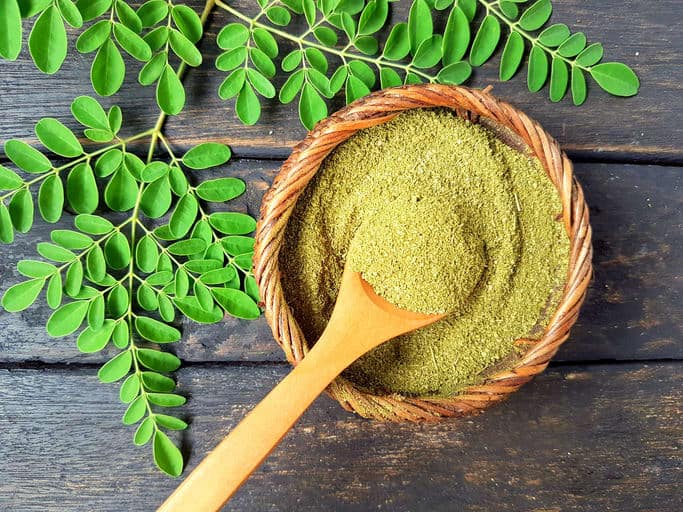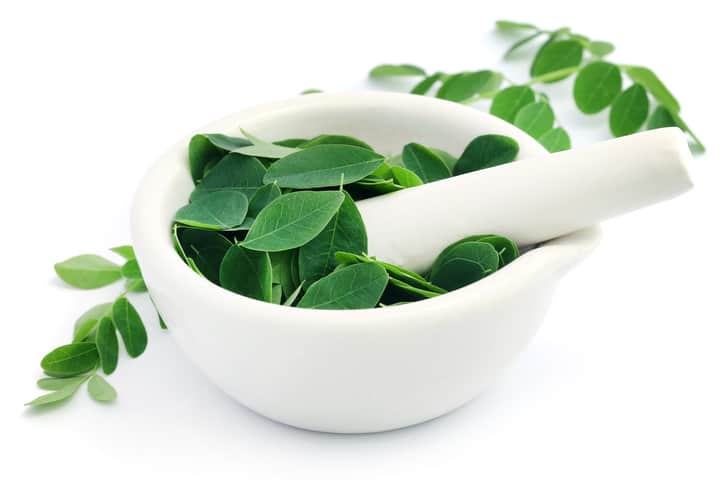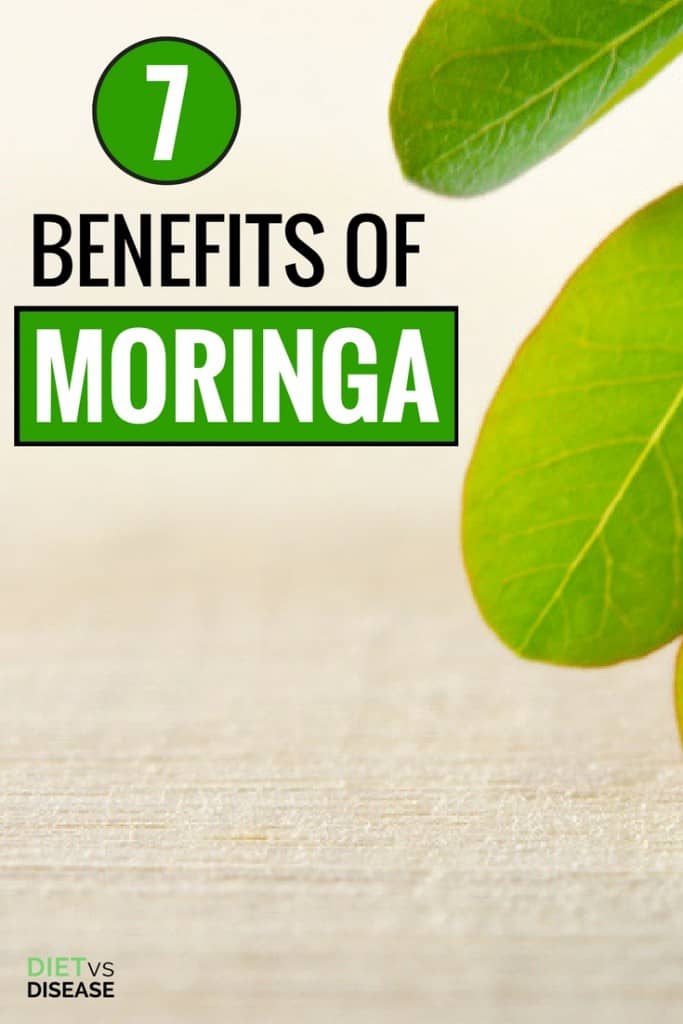Bitter.
That’s the best word I can use to describe moringa, the seeds of which I tried in Uganda.
Despite its strong taste, moringa is quickly becoming a popular nutrition supplement in the U.S.
All parts of the moringa tree — including the seeds, pods and leaves — have long been used in other parts of the world for their nutritional properties.
This article looks at what moringa is and some of its most beneficial uses, including disease prevention and even water purification.
What is Moringa?

Often referred to as the “miracle tree,” the fast-growing moringa tree is actually native to northern India.
The most well-known and widely used part of the tree are its seeds, which have been part of a traditional diet in Asia and Africa for centuries.
Today, moringa is readily available in various forms, including capsules, extracts, oils, powders and teas. The seeds can also be roasted and eaten like nuts, and the flowers can be used to make tea.
However, the easiest way to consume moringa is in powder form, made from dried leaves. The taste is much milder than the seeds, and dried leaves actually contains higher amounts of nutrients than the fresh versions.
Overall, moringa is highly valued for its nutritional benefits. It’s also been used for non-food purposes like biodiesel production and as an ingredient in beauty products (1).
Summary: Moringa originates from northern India and has long been used for nutritional, medical and various non-food uses.
1. Moringa Is Rich In Nutrients
Moringa is rich in vitamins, minerals and bioactive compounds.
One cup (140 g) of moringa seeds contains (2):
- Calories = 37
- Carbohydrates = 8.5 g
- Protein = 2 g
- Fat = <1 g
- Vitamin C = 235% daily value
- Iron = 350% daily value
- Potassium = 13% daily value
- Magnesium = 28% daily value
- Calcium = 3% Daily Value
Note the exceptional amounts of iron (350% of daily value) and Vitamin C (235%).
Moringa seeds also contain 19 of 22 amino acids, including all 9 essential amino acids, which your body can’t produce itself. This is similar to other well-known “superfoods” seeds like sunflower and chia seeds (3).
Meanwhile, the pods are especially fibrous, which can help with digestive issues.
Even with this impressive amount of nutrients, moringa is very low in calories.
Summary: Moringa seeds are low in calories, but rich in essential vitamins, minerals and amino acids.
2. The Moringa Plant Combats Malnutrition
In developing nations, where malnutrition is more prevalent, moringa can be a lifesaver.
In fact, many communities and villages are cultivating the moringa plant in order to make it a staple part of their diet.
Along with its impressive amount of vitamins and minerals, moringa is a good source of protein and essential fats.
The leaves have even been used as a multivitamin supplement because of their high amounts of minerals like iron, calcium, and zinc, all essential for growth and development.
The tree is also resistant to drought and can withstand dry and hot climates, making it an excellent, nutrient-dense food source for impoverished communities.
Summary: Moringa is a good source of protein, fats, vitamins and minerals necessary for proper growth and development. The plant is easy to grow and resistant to drought, making it an important food source for malnourished communities.
3. Can Be Used for Water Purification

Boasting antimicrobial properties, moringa seeds also play a powerful role in water purification in developing nations.
When the oil is extracted from the moringa seeds, a protein-rich “cake” is left behind. This can inhibit bacterial growth and be used to purify water for humans and animals (13).
Because moringa can be grown in abundance, this is an easy, cost-effective way to prevent waterborne diseases.
Summary: Moringa seed extract can inhibit bacterial growth and be used to purify water, making it potable for humans and animals.
4. Acts as an Anti-inflammatory and Antioxidant

Research shows that moringa seeds contain a powerful mix of health-promoting antioxidants (4).
In mouse studies, moringa seed extract functioned as an anti-inflammatory and antioxidant, improving symptoms of ulcerative colitis (UC). This data suggests a similar effect could be seen in humans (5).
Another study found that boiling the seeds increased the availability of both antioxidants and iron (6).
Summary: Moringa seeds offer anti-inflammatory and antioxidant effects, which may help symptoms of ulcerative colitis.
5. Boosts Heart Health

Various studies have found that moringa seeds may be beneficial to heart health.
They contain high levels of monounsaturated fats, which can help lower LDL (bad) cholesterol and may decrease your risk of heart disease and stroke if replacing saturated fat.
In one lab study done on rats, the consumption of moringa seeds decreased oxidative stress and protected heart cells while reducing inflammation (7).
Another study on rats found that moringa seed powder reduced cardiac fibrosis, triglycerides and heart rate, and improved overall cardiac function (8).
Summary: Studies have found that moringa seeds may improve heart health by reducing triglycerides, oxidative stress and inflammation.
6. Moringa Supports Digestion

Due to its high fiber content, moringa pods may be beneficial for your digestion.
Each pod contains around 47% fiber and can help you digest regularly and easily (9).
In saying that, whether you’ll benefit from an increase or decrease in fiber depends on your situation.
It’s also unclear if this would be considered low FODMAP and suitable for IBS as it has not been tested.
Summary: Moringa pods are high in fiber, which can aid digestion in many instances.
7. May Help Fight Cancer

Moringa seeds are known for their potential cancer-fighting abilities.
A protein extracted from moringa seeds has been shown to slow the growth of liver cancer in both human and animal cells by up to 71% (10).
In another lab study, moringa seed extract kept breast cancer cells from significantly growing and spreading (11).
Liver and colon cancer cells have also been shown to decrease significantly when treated with moringa seeds (12).
Although this research only reflects lab studies and cannot be applied to humans, the results are promising.
Summary: Moringa seeds have been shown to slow the growth of cancer cells in various lab studies.
Why You Should Try Moringa Leaves and Seeds
The seeds, pods and leaves of the moringa tree are rich in nutrients and contain very few calories.
Studies have also shown that moringa has anti-inflammatory and antioxidant properties, and may even help improve digestion and heart health too.
In fact, it’s so nutritious that the moringa tree is cultivated in developing countries as it helps combat malnutrition and can even purify water. It’s literally a lifesaver.
Moringa can now be found all over the world in various forms, including capsules, extracts, oils, powders and teas. This is one of the most popular moringa supplements available on Amazon, the reviews are surprising.
Just be prepared for a rather potent flavour.

